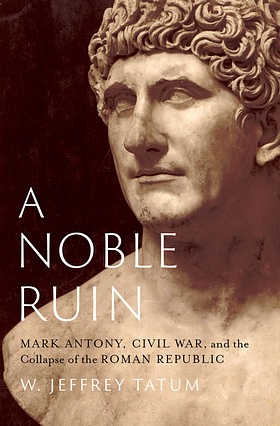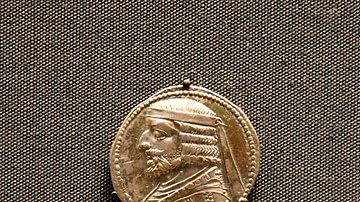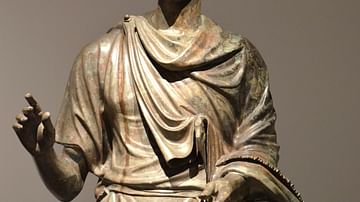In 36 BCE, Mark Antony (83-30 BCE) invaded Parthia, hoping to render himself one of the great conquerors of the Greco-Roman world, but he was stymied by Parthian forces and obliged to undertake an arduous, costly retreat. What to make of this reversal was a major issue then – and remains so now.

Historical Assessment
Historians vary in their assessment of Antony's Parthian campaign. For some, it was a defeat, but not a rout or a disaster like Crassus' crushing defeat in 53 BCE. Others, however, believe this episode so severely tarnished Antony's reputation that it constituted a turning point in his career. Whatever it was, the expedition was not a success. Antony did not capture Phraaspa nor did he defeat Phraates in a decisive engagement. Either achievement would have furnished glory sufficient to sustain Antony's aura of invincibility and preserve his unquestioned Roman predominance.
Critics have not failed to observe, correctly, how Antony underestimated the defences and resolve of the Median capital and misjudged the skill and pertinacity exhibited by the Parthians in protecting their kingdom from invaders. Still, fierce though they were, the Parthians could not drive the Romans away from Phraaspa. The siege failed owing to the Romans' loss of the equipment and supplies they carried in their baggage train, a disaster attributable to Antony's overconfidence and impatience. Nevertheless, even after these losses, the Romans inflicted multiple defeats on the Parthians, even if a decisive victory eluded. Unfriendly to Antony though our sources are, they report that, on their return march, the Romans bested the Parthians no fewer than 18 times. But no retreat, however courageous, can be truly glorious.
Roman View
In his correspondence with Rome, Antony could honestly rehearse his personal heroics and dilate on the punishment his army inflicted on the enemy: never before, he could correctly observe, had Romans marched into Parthian territories and performed so valiantly. These claims may not impress us. But we must ask how credible or persuasive they were from a Roman perspective. What was the likely Roman response – at least for men who were not already hostile to Antony? It might seem intuitive to us that, in a society so bellicose as Rome, defeat was indubitably disgraceful, indeed, intolerable. Certainly, it was no recommendation.
Yet it is clear to us that the Roman view of commanders who suffered military setbacks was complicated by the very real influence of what was then a widely held 'myth of universal aristocratic competence', a popular predisposition that operated even more strongly in favour of the nobility. An unambiguous loss on the battlefield did not obviously diminish the prestige of a noble who fought bravely. This was a judgement, our evidence makes clear, which Romans were all the more likely to reach when it was possible to point to failings on the part of subordinates or the perfidy of allies, not least when these failings contrasted with a general's energy and valour. Furthermore, it was a Roman habit of mind to look at each defeat as a setback that was no more than a single step along their path toward ultimate victory. Antony, the whole world knew, outstared the lightning after his reverse at Mutina (43 BCE). The world expected him to do so again.
Median Reaction
The Roman view of Antony's campaign was not the only view. During the winter, he received an embassy from Artavasdes, the king of Media Atropatene, who now sought an alliance with Rome. Cassius Dio asserts that Artavasdes had fallen out with Phraates in a conflict over the distribution of spoil captured from the Romans. That seems unlikely, since there cannot have been enough in the way of booty seized from the Romans to motivate any serious squabble. But it is not at all surprising that the Romans' invasion, and Phraates' inability to crush it, created tension between the king and his vassals – especially the vassal whose realm had been ravaged and was certain to be the target of Rome's next expedition. On the other side of this war, what Artavasdes saw of Antony's Roman army must have made a profound impression, so much so that he was willing to break with Phraates in order to become a Roman ally. His chief emissary was Antony's friend, King Polemo. Diplomacy now brought Media Atropatene over to Rome, and later, upon the final conclusion of their agreement, the Median restored the standards that Antony had lost during the expedition. The king's friendship was durable: Artavasdes' daughter was later betrothed to Alexander Helios, and the Median king fought for Antony at the Battle of Actium (31 BCE).
For Antony, this overture was welcome indeed. He gained a valuable ally in the region, useful against Armenia and Parthia alike. He could also now legitimately claim that, through his expedition, he had overawed Armenia, subdued Iberia and Albania, and won Media Atropatene for Rome. Doubtless Antony portrayed the Median king as a suppliant, frightened of Roman arms, appalled by Parthian weakness and treachery, and beseeching the republic for its friendship. A great and wealthy kingdom, Antony could and certainly did declare, had been added to the empire. Suddenly the invasion of Parthia was not such a disappointment after all.
A Costly Success?
Rome awaited news of Antony's campaign. Winter will have delayed the arrival of his emissaries, but certainly by spring Octavian and the Roman senate had received Antony's report. Dio describes it as an exercise in self-praise, and doubtless it was. Both Velleius and Florus complain that Antony deported himself as if he had been victorious. But even Antony's enemies, however much it pained them, could not deny the significance of detaching Media Atropatene from Parthia and adding it to the dominion of Rome. Octavian certainly did not deny it. Indeed, he dutifully celebrated his brother-in-law's achievements with public thanksgivings and festivals. These festivities made a lasting impression, which was not entirely dispelled by Octavian's later propaganda campaign nor even by Augustus' later suppression of Antony's reputation.

Virgil, in his Aeneid, introduces Antony as "conqueror of the peoples of the dawn" – victor ab Aurorae populis (VIII. 685) – an expression the later commentator Servius explains with the note, "because he had previously conquered the Parthians" (Serv. A. 8.686), making it clear to us how the line was generally taken. Still, the less attractive aspects of Antony's campaign also eventually became known in Rome, certainly to men in the political class, and some, even some without partisan inclinations, will have been disconcerted by them. After all, the Roman disposition to trust in the martial valour of the nobility, however prevalent, was probably not a universal instinct. For most Romans, however, and so far as Italy knew, Antony's campaign, though costly, had been a success. Parthia had been punished. And would again be punished.
The human cost of this campaign had been great. Many had fallen to Parthian arms. Just as many to disease and complications from wounds. Even approximate casualty figures, however, are difficult to determine. The numbers in our sources are exaggerated and almost certainly derive from Dellius, whose attitude toward Antony was unfriendly. Nonetheless, at least two legions perished in the Parthians' initial attack and thousands more must have joined them before the Romans reached their winter quarters. As is regularly the case, auxiliary losses go unmentioned. These, too, were certainly severe. Probably a quarter of Antony's army, and perhaps as much as a third, was lost. Antony, who was close to his men, felt these losses deeply. Nor, however triumphant his posture, could he ignore the implications of so major a setback in his campaign against Parthia. While his soldiers recuperated in their winter quarters, Antony joined Cleopatra and travelled with her to Alexandria. There, once again, the disappointed triumvir took comfort in her company and counsel. They had much to talk about.






